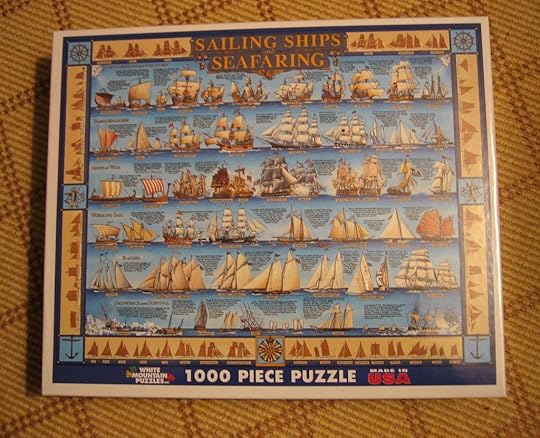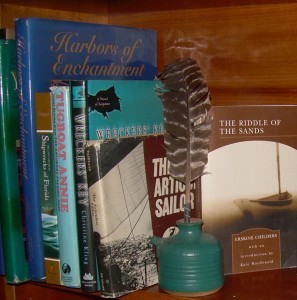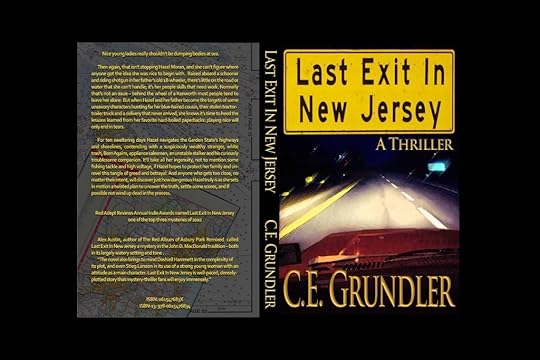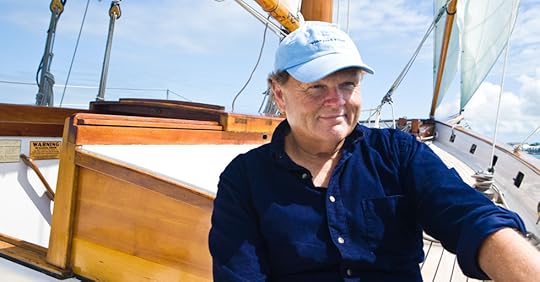Mike Jastrzebski's Blog, page 92
April 24, 2011
From Rags to Riches on the Kindle: Why only .99 cents?
By Mike Jastrzebski
I was at a party at a friend's house last night and as often happens when writers get
together now-a-days the subject of e-books and e-book pricing came up. I mentioned that I had lowered the price of both of my books, The Storm Killer and Key Lime Blues (A Wes Darling Mystery), to .99 cents and the conversation went something like this:
"How's that working for you?"
"Sales are up," I said, "But earnings are down."
"So why do it?"
"Good question," I said. And it is. In fact, I've been asking myself that very question. On the 15th of March when I lowered the price of The Storm Killer to .99 cents I was on track to sell about 375 copies of The Storm Killer and about 650 copies of Key Lime Blues in the month of March. This would have earned me around $2000 dollars had I left the price of both books at $2.99.
My actual sales for March were 778 copies of The Storm Killer and 615 copies of Key Lime Blues, which earned me $1818.00, an estimated loss of $182.00. It's a no-brainer, right? It seems logical that I should raise the price of The Storm Killer back to $2.99. So why did I lower the price of my other book, Key Lime Blues, to .99 cents last week? It's the numbers.
I'm looking to publish Dog River Blues, the sequel to Key Lime Blues, by the end of June. I went live with The Storm Killer last July and with Key Lime Blues (A Wes Darling Mystery) in mid August. To date I've sold just over 6500 copies of both books combined. I'm hoping to sell 1000 plus copies of each book in May and June at .99 cents. This would leave me with a total combined sales of over 10,000 books for the year and I'm hoping that
enough of the readers who bought my books will buy the new book to make up for the lost revenue I may experience over the next two months.
The problem with my expectations is that nobody knows how many people actually read the .99 cent books they buy. I do, and I guess I have two questions for you the reader–do
you buy .99 cent e-books, and if so, do you read them? Please let me know in the
comments section.
To purchase for your Kindle click on the following links: The Storm Killer and Key Lime Blues (A Wes Darling Mystery).
Both books are also available for the Nook at .99 cents– click the following link to buy for the nook: http://productsearch.barnesandnoble.com/search/results.aspx?
To buy at .99 cents for the Sony Reader click the following links to purchase from Smashwords: The Storm Killer and Key Lime Blues.
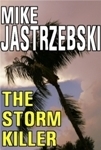
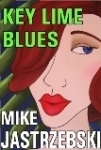
Share on Facebook
April 21, 2011
Matters of the heart
by Christine Kling
As I approach my retirement and my last class next week, I have been showing my students the video of J.K. Rowling giving the commencement address at Harvard in 2008. The speech on "The Benefits of Failure and the Importance of the Imagination" is a bit more than 20 minutes long, but worth watching.
I adore the quote she closes with:
"As is a tale, so is life: not how long it is, but how good it is, is what matters."
— Lucius Annaeus Seneca
When I was a child, my family gave me the nickname "Lightnin'" because I was so slow. I was always the last one to arrive, the last to finish. Today, little has changed. Although I can usually get places on time now, most everything I do is at a slower pace than that of those around me. I didn't go to college at 18 like Rowling did. I went sailing instead, and there are not many slower methods of travel. I did not finish graduate school until I was nearly 40 years old, so I came to the career ladder late, too. And now in my 50's, I'm abandoning that ladder. Again, a late bloomer. I haven't always known what I wanted to do with my life, but I have kept trying and searching to figure it out.
And here I am trying to sell this novel that has been 4 years in the making – a glacial pace by today's standards.
I like the words Thoreau used — I choose to live my life deliberately. How good it is matters a whole lot to me both for my life and for my books. And I don't want to rush either one.
Some of the boaters I know think I have waited excessively long to take off cruising again. They advocate that it is never too early to throw off the dock lines and go. Others, especially those in academia, think I'm mad to turn my back on the offer of tenure to retire early on a paltry pension. And many writer friends repeat the mantra, "Don't quit your day job."
I listen and I thank them for their concerns, but I feel that the time is right for me now. I'm ready to say good bye to teaching, ready to move back onto my boat, ready to pour out all these voices and stories in my head. And I'm ready to risk failure in my attempt.
Another of my favorite commencement addresses is that of Steve Jobs when he spoke to the Stanford graduating class.
"Your work is going to fill a large part of your life, and the only way
to be truly satisfied is to do what you believe is great work.
And the only way to do great work is to love what you do.
If you haven't found it yet, keep looking, and don't settle.
As with all matters of the heart, you'll know when you find it."
~ Steve Jobs
And when I find it, I'll be sure to let you know.
Fair winds!
Christine
Share on Facebook
With wind alone…
It's been hectic for the last few weeks, between getting the last book to print, preparing to launch into the next big project aboard the boat, and travelling, so I haven't been online much and this post is coming to you from on the road, presently on a stop-over with family in Cape Cod. Yesterday I needed a few odds and ends, so my daughter and I ran down the road to the local hardware/home and garden store, and in the process we came across a jigsaw puzzle we couldn't pass up. Like of much what is aimed at the tourist crowds that surge through here in the coming months, it has a nautical tone: in this case 'Sailing Ships and Seafaring'. Row upon row of sailing ships of every variety imaginable make up the illustration, from exploration and discovery to passage makers, ships of war, working sail, racing, and even shipwrecks and survival, and each group shows specific examples from through the centuries from all corners of the world, with short explanations for each. Phoenician traders, Viking knarrs, Polynesian canoes, Chinese junks, Arab dhows, Spanish Galleons, whalers and grand tea clippers. The puzzle's border shows a range of smaller craft from catboats and sloops through to topsail schooners, brigantines and barques.
My daughter was fascinated by the range and variety of vessels that had evolved from the simple concept of wind propelling a floating object, and that led to an interesting discussion of the evolution of indigenous craft. It is much like comparing a hawk to a hummingbird and a gull to a bat or a bumblebee. All have wings, all fly, but each has evolved to a specialized design determined by its environment and purpose. And while my personal favorite, the catboat, might be an ideal craft for these Cape Cod waters, it's not exactly the best boat for San Francisco Bay. Viking ships, with their symmetrical bow and stern, could change direction in an instant, a critical trait for navigating ice-strewn passages. They were built to be highly seaworthy yet fast and light, and could be beached and carried over land as need be. The Chinese junk design dates back over 2,000 years, yet is still used to this day and recognized for its exceptional seagoing capabilities and unique sail characteristics. Majestic clippers evolved to carry pricey cargo such as tea, spices, silk and opium along ocean trade routes, and these swift, slender ships sacrificed carrying capacity for speed, often riding the trade winds at over sixteen knots. It wasn't until the age of steam that these beautiful ships were driven to extinction.
A few years back a fellow stopped off at the boatyard where I had worked; he was traveling down river in a beat-up old canoe full of car batteries and propelled by an electric trolling motor. He needed a place to tie up so he could plug in and recharge his batteries. Oddly enough, his supposedly unplanned arrival was met by the local media, who it seems had been expecting him and covering his newsworthy trip from Canada to Florida "without the use of any internal combustion engine". Apparently I wasn't aware that this was such a notable accomplishment; when one reporter asked me what I thought of the environmental statement he was making, I shrugged and replied that I didn't see the big deal. People had been circling the globe since the dawn of civilization without the aid of engines. The reporter seemed a bit surprised; I don't think that was the answer she'd expected. I pointed out to the river at the gaff-rigged packet sloop Clearwater ghosting past on a light breeze and said "What do you think that's running on right now?"
Much of the world's exploration, work, trade and battles throughout history have taken place with only the wind and water to drive them forward. In this day of instant information and modern high-speed international transportation, borders have become blurred and many forget how civilization grew on this basic method of transportation.
Share on Facebook
April 20, 2011
Putting the Social in Social Media
Three months ago, I wrote a blog for my website and got 6 hits. After you count my mother, my best friend, my co-worker and myself (I don't even think my husband read it) that leaves 2 unknown people who read my work. Last week, my post on eating jerk chicken in Jamaica after horseback riding through the ganja fields garnered 650 hits.
What happened between then and now? I got some good advice.
Neil Plakcy, author of the Mahu mysteries set in Hawaii is a professor of English at Broward College. Last month, he offered a continuing education class in marketing your book. The second I saw the promo for it, I knew I needed his knowledge.
Here's Neil's advice on letting people know your book exists:
E-mail blast all your contacts.
-write a press release on your book and send it to all your friends, family, co-workers, and every press contact you have. Tell people you wrote a book, what it is about, where it is available and how to contact you. Include a clickable link so people can order the book right from the e-mail, if they want.
Create an e-mail signature on your messages
ex: Neil Plakcy
Character-driven stories of handsome, sexy gay men in love and danger www.mahubooks.com http://www.facebook.com/neil.plakcy
Create a website
-pick a domain name that represents you and post information about your book with purchase links and contact information (add it to your e-mail signature)
-add info about you, about your book, your book cover image, your photo
Post Reviews
-ask friends and family to post reviews on Amazon, Barnes and Noble and Goodreads of your book. Next, start to solicit reviews from bloggers, review sites, etc
Groups- Look for opportunities to promote your book by joining an organization like: Mystery Writers of America, Writers Network, or for me it is the International Association of Culinary Professionals and Travel Writers of America
This all made sense, but the next part of Neil's class is where the information really got interesting. Social media. I already had a website where I was blogging on. I thought I was ahead of the game for this section, until Neil started speaking.
Blog Often but Original: For Google to rank your website highly, it must detect real content that relates to your topic—not just a bunch of pictures. If you are going to blog, the idea is to get people who will come back regularly, or subscribe to your blog—and they'll only do that if you regularly have new, interesting content. Neil recommends blogging 2-3 times a week. BUT, the quality of what you post must also be considered. You don't want to turn off your readers with a hurried, unimaginative post. In that case, it is better to post once a week. If you can't blog that often, consider finding a group of others who are trying to reach a similar audience, the way Mike has done with this blog.
Guest Bloggers: Blogging often can be time consuming. Finding others who will reach your audience and bring new readers to your site not only helps with bumping traffic, but gives you a reprieve from posting and gives a fresh voice to your blog.
Post Links on Social Networking Sites: When you do post to your blog, you want as many people reading it as possible. To get the word out, post a description of your topic and a link on:
And because my blog includes a recipe and pictures I post to:
Join Discussion Groups: There are many writer/reader websites that allow you take part in their discussions. The more you participate in the conversation, the more your name and the name of your book gets out to other people who love to read.
I joined a Kindleboards conversation on a Saturday and talked about six other books than my own and yet still my sales spiked that day. Kindleboards allow you to add the cover of your book with a link to the Amazon sales page in your signature so that every time you post a comment your book shows up. If you are posting in the relevant topic discussions, you can feel confident that the people reading the posts are interested in that topic and ultimately your book.
Neil also promotes joining discussion groups like:
Amazon discussion boards
Yahoo Groups
Google Groups
This all adds up in hours. It usually takes me 2-3 hours to write and edit a post. 30 minutes to post it and work out the formatting and another hour or sometimes two to promote it on each different social networking site. BUT, the payoff is the 650 hits I got last week. I hope that translates into getting the word out about my book, and convincing potential readers to buy it.
Next, I am going to look into www.squidoo.com and www.blogher.com. Maybe this week's post on spear-fishing in Florida and grilling Chili-Lime Hogfish will be seen by 800 people? And that is thanks to Neil's class and guidance.
Social media has definitely helped me gain readers, but it has an (obvious) secondary benefit. I am talking to readers and authors. Writing can be a lonely, stuck behind your computer, locked away in a quiet room kind of world. Social media is just that social. It is all about connecting. It may be a lot of work, but it is fun work.
And really, isn't that why we all became writers—to talk about books?
What about you? What do you do to promote your writing?
Victoria Allman, author SEAsoned: A Chef's Journey with Her Captain, has been following her stomach around the globe for twelve years as a yacht chef. She writes about her floating culinary odyssey through Europe, the Caribbean, Nepal, Vietnam, Africa and the South Pacific in her first book, Sea Fare: A Chef's Journey Across the Ocean.
SEAsoned, Victoria's second book is the hilarious look at a yacht chef's first year working for her husband while they cruise from the Bahamas to Italy, France, Greece and Spain; trying to stay afloat.
Victoria is a columnist for Dockwalk, an International magazine for crew members aboard yachts. Her column, Dishing It Up, is a humorous look at cooking for the rich and famous in an ever-moving galley.
She also regularly contributes tales of her tasty adventures to Marina Life Magazine and OceanLines.biz.
You can read more of her food-driven escapades through her web-site, www.victoriaallman.com
Share on Facebook
April 18, 2011
Code on the Water
by Tom Tripp
Here on Write on the Water, regular readers have met many folks who live aboard while managing their productive passion. In my own writing business I've been lucky enough to meet many of these people. I'd like to introduce a truly unique couple, who managed to develop and run an entire boating website mostly while living aboard their 53' DeFever trawler.
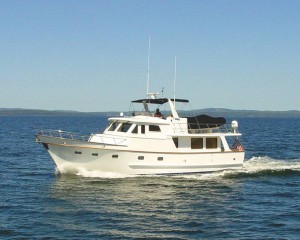
aCappella, a 53' RPH DeFever Trawler Owned by Jeff and Karen Siegel
Jeffrey and Karen Siegel are the owners of ActiveCaptain, a web-based interactive cruising guide – a label which utterly fails to describe the plethora of useful cruising information available on the website. While home base is a residence ashore in Castine, Maine, Jeff and Karen spend most of the year aboard aCappella, traveling up and down the East Coast, enjoying a nomadic existence while managing a business that requires them to write computer code, manage a sophisticated website, relationships with vendors, business partners and literally thousands of users and participants. They do all of this from their boat, principally via Internet connections in marinas and anchorages between Castine and Key West.
The Siegels are experts in electronic communication and have authored several freelance articles on choosing smartphones and other devices for use aboard the boat. Some of this has been driven by the requirement to enable mobile device use of the ActiveCaptain resources.
A note here for the cruisers among us — ActiveCaptain collects local knowledge from its (free registration) users, who also provide up-to-date info on fuel prices and marina experiences. The database is also being incorporated in the latest versions of navigation software from most major vendors, updated in real time whenever the nav software connects to the Internet. A recent enhancement allows users to store and share saved GPS routes.
They also blog about their domestic bliss aboard aCappella here. It's an entertaining blog written often from the perspective of the two canine travelers aboard, Dylan and Dyna. The Siegels share their own cruising stories on the blog, with good tips for tackling provisioning, storage and replenishment challenges.
There are a lot of ways to work and live on the water and while Karen and Jeff Siegel spend more time than most of the rest of us writing in the language of zeros and ones, they too write on the water.
Share on Facebook
April 17, 2011
From Rags to Riches on the Kindle: The "in crowd"
I know that Christine's post on Friday got a lot of people thinking, including me. Christine and I have belonged to the same critique group for about four years now and along with reading each other's books we've talked a lot about publishing in general. I think it's fair to say that Christine has been my writing mentor since I moved to Ft. Lauderdale five years ago and discovered that she lived on her boat one building away from where my wife, Mary, and I lived on our boat.
It was Christine who talked me into joining Mystery Writers of America and volunteering to work at the Sleuthfest conferences over the past four years. Christine introduced me to many of the local writers and when I went to Thrillerfest two years ago she made an effort to introduce me to some of the better known writers in the field. She certainly has been a part of the "in crowd" she wrote about in Friday's blog.
I mention this because over the past year I've been encouraging Christine to join the Indie book revolution, but I can understand why she might not want to do so.
Since I've known Christine, I've been very aware of that crowd she belongs to, the traditionally published writers. In fact, I've done everything I could to join them. Fortunately for me, I failed to do so. Why fortunately? Because had I joined the crowd, I might not have self published my two books.
Now I'm not one of those run-away success stories we're all reading about. I haven't sold ten or twenty or thirty thousand books in a month. I released The Storm Killer in June of 2010 and followed it up in August of 2010 with Key Lime Blues (A Wes Darling Mystery).This is the first month since the release of these two books that I will probably sell more than 1000 books in a month. (So far this month I have sold 644 copies of The Storm Killer and 258 copies of Key Lime Blues so I feel confident making this prediction.)
in June of 2010 and followed it up in August of 2010 with Key Lime Blues (A Wes Darling Mystery).This is the first month since the release of these two books that I will probably sell more than 1000 books in a month. (So far this month I have sold 644 copies of The Storm Killer and 258 copies of Key Lime Blues so I feel confident making this prediction.)
Still, if an offer from a traditional publisher came my way, it would be hard to turn it down. I'd like to think I would, but who knows. At any rate, Christine is a fine writer and I'm sure that no matter which avenue she chooses to pursue she'll be successful at it. As for myself? I'm making a little money at my writing, answer to no one but myself, and write what I want to write–plus I live on a sailboat in paradise with a beautiful woman–what more could a guy ask for?
And who the hell knows. If things keep going like they are, maybe some of the "in crowd" will drift on over and join the Indie revolution.
Share on Facebook
April 14, 2011
Is print the new vanity press?
by Christine Kling
As those of you who have followed my blog posts here know, I have recently finished a new novel, and I've been trying to find my way back into the publishing world, trying to navigate all the changes that have taken place in the years I've been off writing. Though I am intrigued by self-publishing, the lure of a print contract pulls strongly at my heart. So, when I finally finished this book, I decided I would need to get myself an agent.
Some of you may be wondering what the back story is on this. How did I go from publishing novels with with a big New York publisher to trying to find an agent?
I am one of those midlist authors you hear talk about who did not have "good enough" sales on the four books in my series, in spite of all my efforts at publicity. Though I still get wonderful emails from fans wondering when the next Seychelle book will come out, and most of the reviews of the books were positive, I did not sell enough of any of the four books in the series to be considered a success in the eyes of New York publishing. In many ways, that makes me something of a pariah in this business.
Nearly five years ago, when I turned in the final edit on Wreckers' Key, I sat down with my editor and said, "I have a suspicion that if I turn in an outline and sample chapter for book five in my series, you all are going to reject it."
He said, "I'm glad you said that so I don't have to. You're probably right, but by recognizing that, you're ahead of dozens of other authors walking around this conference right now who are in the same situation, but can't admit it to themselves."
I told him that though my contract said I could submit a proposal/outline, I wanted to go off and write the whole book and try to wow them with the new reinvented me. My editor agreed that it was a great idea. Then I went to my agent and told her what I planned to do. She said, "Okay, if you're going to reinvent yourself, you need to stop writing about boats."
"Say what?" I said.
"You could write about anything. If you're really going to reinvent yourself, change the subject and ditch the boats."
I hung up the phone and thought about it. I remembered the famous story Tony Hillerman used to tell about the time when his agent couldn't sell his first novel and she told him to go rewrite the book and "get rid of all the Indian stuff."
Now, I'm the first to admit that I'm no Tony Hillerman, but like Hillerman, I have to follow my passion — and my passion is for the sea and boats. So, I sat down and wrote a letter to my agent telling her that it was time for us to part ways.
So, here I am now four long years later with this new book and a desperate desire to get it into the hands of readers. I have to start over from scratch.
When I went to the Writers' in Paradise conference in January, I tried to talk to the agent there, but she kept dodging me once she knew of my situation. I'd join the group she was chatting with, and she'd announce her glass needed filling. Third time was the charm. Remember that pariah word? All the other unpublished authors at the conference were of far more interest to her because they represented unknown possibilities. My rookie card had already proven itself to be worth no more than the paper it was printed on.
So, the next conference up was Sleuthfest at the end of February, and afterwards, I sent the complete manuscript to three agents (who had asked for it). Two have already rejected the book. I've not heard back from the third.
I know these agents are smart and good at what they do, and if they don't think they can sell the book, I trust their judgement. The market is brutal out there as the sales of print books decline. And I write quirky books, not Patterson-esque best sellers.
So, I find myself alone with no agent, no contract, and only the outstanding clause in my last contract that said my publisher has the option to take the first look at my next book-length work of fiction before I can do anything else with it.
The last week of March it became clear to me that I could wait a very long time for these agents to get back to me, and they could still reject me like a couple of very bright ones already had. And my retirement date is only three weeks off — that date when I am following through on the mantra of this blog, and quitting my job to go sailing and to write full time. The paychecks are about to stop, and I don't have the luxury of time here.
So, I decided to send the book on to my editor myself without representation by an agent. I've been thinking of this as a formality, thinking that surely he is going to reject the book, and then I will be able to get on with the business of finding a cover designer and publishing it myself as an ebook.
When I contacted him, I was very surprised when he sounded eager to read the manuscript, and it suddenly occurred to me, what if he does make an offer? And that was when my ego kicked in and I thought, well, even if it isn't very much money, wouldn't it be lovely to be back in print? I mean the ideal world would be one where where I have both a print publisher and I write enough books to self-publish some of them like Tim Hallinan does. How little money would I be willing to settle for to once again see reviews of my books in newspapers, to be able to crack open that first box of books and smell the sweet smell of fresh paper? Sure, I could probably make more money by self-publishing like our own Mike J-, J.A. Konrath, L.J. Sellers, Bob Mayer, and Barry Eisler have shown. But wouldn't it feel good to be back with the "in crowd" and not a pariah anymore? And that was when the question hit me. For someone like me, has a print deal with a New York publisher has become the new vanity press?
What do you think?
Fair winds!
Christine
Share on Facebook
What day is it?
Ever get that feeling you're forgetting something? I woke with that this morning.
Let's see. It's Thursday, April 14. Hmmm.
Taxes, done. Bills paid. My wedding anniversary is in four days. Tradition is that we mutually 'forget' the date, then buy each other something for the boat. Isn't the twenty-fifth the 'teak' anniversary?
The 14th… Thursday… Oh, wait! THURSDAY! My post on Write On The Water!
Yeah, that would be it. My post. Okay. Crank up the laptop, fire up the caffeine and regroup the brain cells, which I'd let sleep late this morning.
This is what happens when you burn the candle at both ends. My switch from a full-time day job to full-time writer hasn't done much to improve my schedule. I find I still do some of my best writing done before dawn, but now I can work through the day and into the night as well. I'm working more hours than I ever worked when I got a paycheck, but the difference is that it's satisfying work. Sales on Last Exit have been steadily improving and I've received some wonderful letters from readers as well as growing requests for a printed copy of the book. Some readers wanted to give one as a gift to a non-ebook-reading friend. Some reviewers expressed interest, but prefer printed copies. And there were numerous promotional opportunities such as on Goodreads that require a print book. So for the last week I'd focused my attention on going to print.
First off, I researched all the current options and in the end chose to go with Createspace and upgraded to the Pro account ($35). For one thing, Konrath and numerous other top-selling indie authors use Createspace. They all state that the books look fantastic and that Createspace is cost effective, easy to work with and offers multiple avenues for distribution. I can order copies directly through Amazon at a significant discount and qualify for free shipping, and with the purchase of my own ISBN ($99) I can distribute them however I see fit.
Step one was to format the book to a printable PDF for the 6 x 9" print size I'd selected. Createspace provides multiple downloadable MS Word templates, and from there it was fairly smooth sailing, aside from Word repeatedly trying to auto-format my contents. Once I'd shut most of Word's default auto-complete features I was able to format the text to flow precisely the way I wanted, then convert it to a printable PDF. And now that I knew it totaled 253 pages, I had the dimensions needed to complete the spine and back cover.
The thing about an e-book is that you never have to think about a back cover. I've always loved my book's cover, which I illustrated myself, though between the image and the title there was nothing indicating that most of this story takes place 'on the water.' The back cover gave me the chance to remedy that, and found me digging through my chart collection, as well as my truck's glove-box for a map of New Jersey. I scanned a chart of Sandy Hook and a map of NJ, scaled, positioned and adjusted them to a dimly-lit appearance in keeping with the rest of the image. Insert the blurb and such, fiddle with the contrast a bit, add edges for print bleed, hit 'save as PDF'.
I finished uploading everything late yesterday. From here it's a matter of waiting for a review and approved, which should be within 48 hours or so. Once I sign off on the proof I'm good to go, and from what I understand the entire process can take as little as a week before books are available for sale.
Now if only I can keep track of the rest of my schedule!
(NOTE: I just noticed I'd already received a review reply at 5:43 this morning. It seems I need to make a small and very easy fix to my cover, everything else is good. That's just over 12 hours since I submitted! That'll teach me to sleep late!)
Share on Facebook
April 12, 2011
Being Scott Kirby
(Scott Kirby off the waters of Key West, Florida)
If I were a rock musician, I'd want to be Mark Knopfler- great lyrics, unmistakable guitar licks, signature-cool vocals. Yet as much as I would like to be a writer-version of Knopfler, I remember a radio interview with another guitar great - BB King – in which BB mentioned some early advice he received. The young BB King was concerned that he didn't match-up well against one of his contemporaries. BB's manager told him not to worry about others, just focus on being the best BB King he could be. Seems he did pretty well at that.
BB's not alone in this respect. Here's a quote from the architect Frank Gehry: "The best advice I've received is to be yourself. The best artists do that…. [F]ind your own way because then you're the only expert. Some people might not like what you do, but still, you're the only expert."
But if this is a core truth, you might ask, what gives with the title of today's blog, Being Scott Kirby?
You might even ask, Who is Scott Kirby?
For those of you who haven't hooked into TropRock, Scott Kirby is a singer-songwriter who grew up in New England but eventually found his way to Key West, Florida. I first heard his music five or six years ago. Occasionally, his songs pop up on a satellite radio (Sirius 31 – Radio Margaritaville). But it's been iTunes that really connected me to Kirby's music. In fact, four or five of his tunes play almost daily on my iPod.
Use the below link to sample some songs from Row Me Home:
http://itunes.apple.com/us/album/row-...
If you like smart lyrics, salt water, and a jangling guitar you might like the music. I do, and I've passed his name along, word-of-mouth. Hopefully this blog posting goes even further.
But what's this about Being Scott Kirby? Simple. I want to be an e-book version of this musician. He has a growing, respectable following and fans around the world can now find Kirby's new album Row Me Home via the web. They can sample his music before making a purchase, and if would-be buyers find that songs about life by the sea and time on the water are of interest, they need only click and purchase just as I have done.
I very much believe that BB King and Frank Gehry had it right, so I'm focused on being the writer that's me. But as far as building a loyal grass roots fan base by word-of-mouth? In that respect, yeah, I like the idea of Being Scott Kirby.
Share on Facebook
I'd rather be lucky than good
By Michael Haskins
Mike J has blogged about his successes on Kindle and he and I have talked after MWA
luncheons about Kindle. I finally took his advice and now have two novels and a
few short stories on Kindle and the two novels are also on sale as trade
paperbacks on Amazon.
I bring this up because I hadn't planned on doing more then the short stories and the first
novel, Chasin the Wind, because I received the rights back to it. Then a
strange thing happened . . . let's go back to 1998. Hurricane Georges blew through the Lower Keys and took my floating home and most everything else I own with it. That included all of my writing. I had three completed novels and one almost completed novel on floppy back-up disks, but lost track of what I had done with it. No small flash drives
available then.
The unfinished manuscript and two of the completed ones were my first efforts at writing about Liam 'Mad Mick' Murphy. The other was a stand-alone: There Are No Good Guys, Only Terrorists. Lost to the ages, it was a third person thriller that I
couldn't image trying to write again from memory.
Then a strange thing happened. In cleaning out my file draw of disks recently, I found some old, I guess 2×2 floppies, but didn't have a way to open them. One had "three" written on it and I wondered if it had the three novels or three chapters of something. My friend Rich had the equipment to open it and offered, so I handed over the floppy.
Since I had started cleaning the stored CD files, I continued and, just like in the movies, the third CD from the back of the row had "three" written on it. For kicks, I put it in the CD drive of my desktop computer and, to my total amazement, the three Murphy manuscript titles appeared. I couldn't open them, they were written and saved in Word Perfect.
But my old XP laptop had Word Perfect, so I gave that a try and they opened. With a lot of effort, I finally got the three manuscripts into Word.docs. I still had a lot of formatting problems to overcome, but I could read them. Eventually I got through reading and
formatting the second book, Tijuana Weekend.
I chose this manuscript because when I read the first one (that, for some ungodly reason I titled KEEPER) I saw it needed more rewriting than Tijuana Weekend. The third, untitled is how I titled it, needs an ending, but still holds up pretty much.
I finally got Tijuana Weekend edited, used an old bullfight program cover design for the cover and had the book formatted for Kindle and it is now on both Kindle and Amazon as a trade paperback. It still needs a little tweaking, but the story holds up.
All writers have manuscripts hidden away that we hope will never see the light of day, but how many rediscover 'lost manuscripts?' I feel it was luck and, as they've said in movies and books for years, "I'd rather be lucky than good."
I have to finish the book I am currently writing, Stairway to the Bottom, and then I will go to work on KEEPER, and first thing will be to rename it, maybe, REVENGE, or something along those lines. When it is done, it will be my third novel on Kindle. I will then rewrite and find an ending and title for untitled.
If I can get KEEPER/REVENGE on Kindle by January 2012 and untitled on Kindle by June 2012, I will see if Mike is right about the more books up the more sales you'll see.
I am currently on the road to Houston for a book signing on April 23, then onto LA where I will be at the LA Times Book Festival, signing Free Range Institution at 3 pm on April 1 – no joke! After that, I have three bookstore signings. If you are in the area and interested in dates and times of the signing, please check my website, www.michaelhaskins.net, for the
locations, dates, and times.
My next Mick Murphy mystery, Car Wash Blues, is due in August 2012. No date has been given for the mystery I am working on now, Stairway to the Bottom, but at the earliest it would be sometime in 2013. By then, I should have four books on Kindle and Amazon\
Fair winds and following seas, Mike, and thanks for sharing your knowledge.
Share on Facebook

